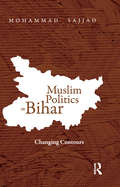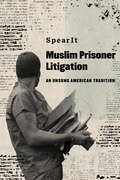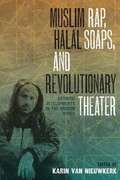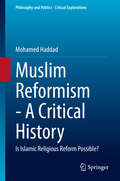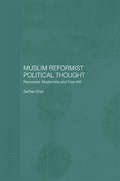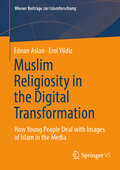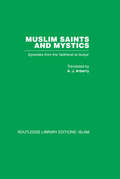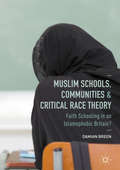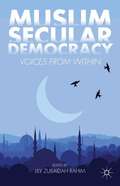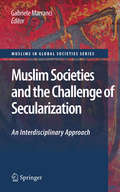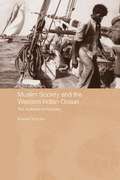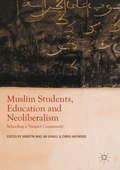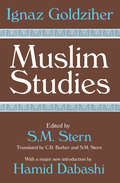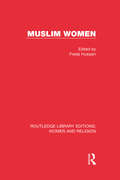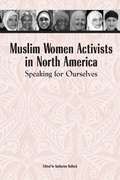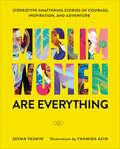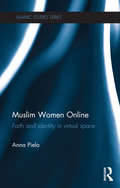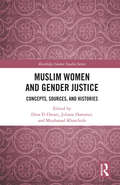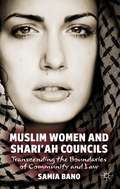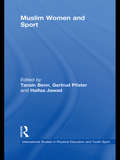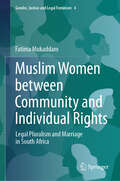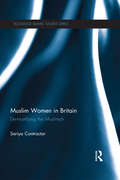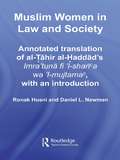- Table View
- List View
Muslim Politics in Bihar: Changing Contours
by Mohammad SajjadThis book studies the engagement of various Muslim communities with Bihar politics from colonial times to present-day India. It debunks several myths in highlighting Muslim resistance to the Two-Nation theory, and counters the ‘Isolation Syndrome’ faced by Muslim communities after Independence. Using rare archival sources and hitherto unexamined Urdu texts, this book offers a nuanced exploration of complex themes such as the struggle against Bengali hegemony, communalism, regionalism and alienation before Independence, recent language politics, the political assertion of low-caste Muslims in current Bihar, as well as their quest for social and gender justice. An important contribution to the study of South Asian Islam, this book will interest students and scholars of modern Indian history, politics, sociology, religion, gender, and minority studies.
Muslim Prisoner Litigation: An Unsung American Tradition
by SpearItSince the early 1960s, incarcerated Muslims have used legal action to establish their rights to religious freedom behind bars and improve the conditions of their incarceration. Inspired by Islamic principles of justice and equality, these efforts have played a critical role in safeguarding the civil rights not only of imprisoned Muslims but of all those confined to carceral settings. In this sweeping book—the first to examine this history in depth—SpearIt writes a missing chapter in the history of Islam in America while illuminating new perspectives on the role of religious expression and experience in the courtroom.
Muslim Rap, Halal Soaps, and Revolutionary Theater
by Karin Van NieuwkerkFrom "green" pop and "clean" cinema to halal songs, Islamic soaps, Muslim rap, Islamist fantasy serials, and Suficized music, the performing arts have become popular and potent avenues for Islamic piety movements, politically engaged Islamists, Islamic states, and moderate believers to propagate their religio-ethical beliefs. Muslim Rap, Halal Soaps, and Revolutionary Theater is the first book that explores this vital intersection between artistic production and Islamic discourse in the Muslim world. The contributors to this volume investigate the historical and structural conditions that impede or facilitate the emergence of a "post-Islamist" cultural sphere. They discuss the development of religious sensibilities among audiences, which increasingly include the well-to-do and the educated young, as well as the emergence of a local and global religious market. At the heart of these essays is an examination of the intersection between cultural politics, performing art, and religion, addressing such questions as where, how, and why pop culture and performing arts have been turned into a religious mission, and whether it is possible to develop a new Islamic aesthetic that is balanced with religious sensibilities. As we read about young Muslims and their quest for a "cool Islam" in music, their struggle to quell their stigmatized status, or the collision of morals and the marketplace in the arts, a vivid, varied new perspective on Muslim culture emerges.
Muslim Reformism - A Critical History: Is Islamic Religious Reform Possible? (Philosophy and Politics - Critical Explorations #11)
by Mohamed HaddadThis book examines the evolution of Islam in our modern world. The renowned Tunisian scholar Mohamed Haddad traces the history of the reformist movement and explains recent events related to the Islamic religion in Muslim countries and among Muslim minorities across the world. In scholarly terms, he evaluates the benefits and drawbacks of theological-political renovation, neo-reformism, legal reformism, mystical reformism, radical criticism, comprehensive history and new approaches within the study of Islam. The book brings to life the various historical, sociological, political and theological challenges and debates that have divided Muslims since the 19th century. The first two chapters address failed reforms in the past and introduce the reader to classical reformism and to Mohammed Abduh. Haddad ultimately proposes a non-confessional definition of religious reform, reinterpreting and adjusting a religious tradition to modern requirements. The second part of the book explores perspectives on contemporary Islam, the legacy of classical reformism and new paths forward. It suggests that the fundamentalism embodied in Wahhabism and Muslim Brotherhood has failed. Traditional Islam no longer attracts either youth or the elites. Mohamed Haddad shows how this paves the way for a new reformist departure that synthesizes modernism and core Islamic values.
Muslim Reformist Political Thought: Revivalists, Modernists and Free Will (Central Asia Research Forum Ser.)
by Sarfraz KhanThere are two main trends distinguishable amongst Muslim reformists - revivalists and modernists. This book charts and analyses the main trends of Muslim reformist political thought in Bukhara. It is the first to utilize original sources preserved in Soviet archives that were previously inaccessible to western scholars. The author has translated numerous original documents from Tajiki and Russian into English. This book thus serves as a useful resource for students of Islam, Central Asia, the former Soviet Union, and of law, politics and philosophy.
Muslim Religiosity in the Digital Transformation: How young people deal with images of Islam in the media (Wiener Beiträge zur Islamforschung)
by Erol Yildiz Ednan AslanThe effects of social media can be observed particularly in relation to the religious commitment and religious practices of young people - who today are summarized under terms such as "internet generation", "media generation" or "digital natives". Online media exert a major influence on their lives, their understanding of the world, their religious orientations and actions. Their identity constructions, their cultural and religious orientations are closely intertwined with social media. This is precisely where the present study started with the question of what subjective consequences interaction on the social web has for the religious orientations, practices and self-conceptions of Muslim young people in Austria. The focus was on the connections between media use, media images of Islam and lived religiosity. On the one hand, the results show that the use of social media creates objective spaces of opportunity that can go hand in hand with an expansion of individual scope for action, whereby religious authority is increasingly being questioned. On the other hand, the study also shows that the use of digital media can also lead to a narrowing of individual religious orientations.
Muslim Saints and Mystics: Episodes from the Tadhkirat al-Auliya' (Memorial of the Saints)
by Farid al-Din AttarThis is a major work of Islamic mysticism by the great thirteenth-century Persian poet, Farid al-Din Attar. Translated by A J Arberry, Attar’s work and thought is set in perspective in a substantial introduction.
Muslim Schools, Communities and Critical Race Theory
by Damian BreenThis book explores the position of Muslim schools in contemporary Britain. A Critical Race Theory approach is used to consider some of the specific issues faced by Muslim schools, in particular those looking to become state-funded. The book provides a critically considered and meaningful application of a theory of 'race' to Muslims as a religious community, without restricting the analysis to minority ethnic Muslim groups; it also provides a counter-narrative which contests assumptions about Muslim schools presented in the media and in public debates more generally. These insights are positioned against current political climates within which Muslims have been consistently subjected to surveillance and suspicion. The book draws on first-hand research carried out inside Muslim schools to offer insights into the ways that these schools cater to diverse and locally-specific needs. It concludes by arguing that independent Islamic schools represent ideal models of community need. Therefore, bringing such schools into the state sector, in a way that allows them to retain autonomy, represents an ideal strategy for the educational and political enfranchisement of British Muslims. Muslim schooling represents an opportunity for increased state investment in Muslim interests as a strategy for offsetting the ways in which Muslim communities have been marginalised more generally in contemporary political climates. The book will make compelling reading for students and researchers in the fields of Education, Sociology, and Religious Studies, particularly those with an interest in faith schools, Islam, and Critical Race Theory.
Muslim Secular Democracy
by Lily Zubaidah RahimThe book offers a nuanced and innovative analyses of the emergence of an inclusive secular democratic state paradigm which incorporates the sacred within the framework of secular democracy in the Muslim World.
Muslim Societies and the Challenge of Secularization: An Interdisciplinary Approach
by Gabriele MarranciScholars from various disciplines worked together to present the first interdisciplinary book to address the issue of Islam, secularism and globalization. The book has a clear structure which represents its interdisciplinary approach: the first section addresses the philosophical and historical discussion about Islam and secularism; the second section discusses the topic from an ethnographical and social anthropological viewpoint; and the final section addresses Islam, secularism and globalization from a political viewpoint. This unique collection not only offers innovative research and new material, it also provides empirical examples and theoretical debates, and could therefore also be used as a textbook for courses on Islam, globalization, anthropology, politics, sociology and law.
Muslim Society and the Western Indian Ocean: The Seafarers of Kachchh (Routledge Indian Ocean Series)
by Edward SimpsonBased on substantial ethnographic, textual and archival research, this interesting book offers a new perspective on the anthropology of the western Indian Ocean. Writing in a clear, engaging style, and covering an impressive range of theoretical terrain, Simpson critically explores the relationships between people and things that give life to the region and drive shifting patterns of social change among Muslims in the highly-politicized state of Gujarat. Scholars of the Indian Ocean, Muslim society in South Asia, and Hindu nationalism, as well as anthropologists in general, will find this a fascinating read and a major contribution to research in this area.
Muslim Students, Education and Neoliberalism
by Chris Haywood Máirtín Mac an GhaillThis edited collection brings together international leading scholars to explore why the education of Muslim students is globally associated with radicalisation, extremism and securitisation. The chapters address a wide range of topics, including neoliberal education policy and globalization; faith-based communities and Islamophobia; social mobility and inequality; securitisation and counter terrorism; and shifting youth representations. Educational sectors from a wide range of national settings are discussed, including the US, China, Turkey, Canada, Germany and the UK; this international focus enables comparative insights into emerging identities and subjectivities among young Muslim men and women across different educational institutions, and introduces the reader to the global diversity of a new generation of Muslim students who are creatively engaging with a rapidly changing twenty-first century education system. The book will appeal to those with an interest in race/ethnicity, Islamophobia, faith and multiculturalism, identity, and broader questions of education and social and global change.
Muslim Studies: Volume 1
by George McCueThis is the first volume of Goldziher's Muslim Studies, which ranks highly among the classics of the scholarly literature on Islam. Indeed, the two volumes, originally published in German in 1889-1890, can justly be counted among those that laid the foundations of the modern study of Islam as a religion and a civilization. The first study deals with the reaction of Islam to the ideals of Arab tribal society, to the attitudes of early Islam to the various nationalities and more especially the Persians, and culminates in the chapter on the Shu'ubiya movement which represents the reaction of the newly converted peoples, and again more especially the Persians, to the idea of Arab superiority. The second essay is the famous study on the development of the Hadith, the -Traditions- ascribed to Muhammed, in which the Hadith is shown to reflect the various trends of early Islam: Goldziher's name is mainly associated with the critical study of the Hadith, of which this essay is the chief monument. The third essay is about the cult of saints, which, though contrary to the spirit and letter of the earliest Islam, played such an important part in its subsequent development. These essays, with the author's marvelous richness of information, profound historical sense, and sympathetic insight into the motive forces of religion and civilization, are today as fresh as at the time of their original publication and their reissue is indispensable for the growing number of students of Islam. Hamid Dabashi contributes a major eighty-five-page study of Goldziher's life and scholarship, situating both in the intellectual and political currents of his own time while evaluating his work in the context of the current debate over Orientalism.
Muslim Volunteering in the West: Between Islamic Ethos and Citizenship (New Directions in Islam)
by Mario Peucker Merve Reyhan KayikciThis edited volume explores various facets of Muslims’ civic engagement in Western post-secular societies, fundamentally challenging simplistic boundaries between Islamic ethical conduct and liberal-democratic norms and practice.Bringing together scholars from sociology, anthropology, and Islamic theology, the collection offers sound theoretical and empirical elaborations on the complex ways in which Islamic piety, principles and norms interact with, and shape, Muslims’ everyday practice of volunteering as a performance of active citizenship in liberal societies. The contributions cover diverse manifestations of Muslim volunteering in North America, Europe and Australia, from environmentalism to mental health volunteering, and critically examine the national and global socio-political context within which certain forms of Muslims’ civic engagement are viewed with skepticism and suspicion. It will be of use to students and scholars across sociology, political science, community studies and Islamic studies, with a focus on migrant integration, diaspora studies, and inter-ethnic relations.
Muslim Women (RLE Women and Religion)
by Freda HussainThe history of Islam and the changing role-performance of Muslim women, given the various interpretations of the belief system of Islam, are described. It is the contention of the authors that it is these various interpretations which have given rise to the conflict between the ideal and contextual realities. This book also includes papers which investigate the problems of feminism and employment for Muslim women, as well as the educational and legal aspects of their lives in contemporary Islamic society.First published in 1984.
Muslim Women Activists in North America: Speaking for Ourselves
by Katherine BullockIn the eyes of many Westerners, Muslim women are hidden behind a veil of negative stereotypes that portray them as either oppressed, subservient wives and daughters or, more recently, as potential terrorists. <P><P>Yet many Muslim women defy these stereotypes by taking active roles in their families and communities and working to create a more just society. This book introduces eighteen Muslim women activists from the United States and Canada who have worked in fields from social services, to marital counseling, to political advocacy in order to further social justice within the Muslim community and in the greater North American society.
Muslim Women Are Everything: Stereotype-Shattering Stories of Courage, Inspiration, and Adventure
by Seema YasminWinner of the 2021 International Book Awards Winner of American Book Fest's 2020 Best Book Awards in Women’s IssuesA full-color illustrated collection of riveting, inspiring, and stereotype-shattering stories that reveal the beauty, diversity, and strength of Muslim women both past and present.Tired of seeing Muslim women portrayed as weak, sheltered, and limited, journalist Seema Yasmin reframes how the world sees them, to reveal everything they CAN do and the incredible, stereotype-shattering ways they are doing it.Featuring 40 full-color illustrations by illustrator Fahmida Azim throughout, Muslim Women Are Everything is a celebration of the ways in which past and present Muslim women from around the world are singing, dancing, reading, writing, laughing, experimenting, driving, and rocking their way into the history books.Forget subservient, oppressed damsels—say hello to women who are breaking down barriers using their art, their voices, and their activism, including:Tesnim Sayar from Denmark, a Muslim goth-punk who wears a red tartan mohawk on top of her hijabAmerican superstar singer SZANura Afia, CoverGirl’s first hijabi ambassadorIlhan Omar and Rashida Tlaib, America’s first Muslim congresswomenIlyana Insyirah, a hijaab-wearing scuba-diving midwife from AustraliaShowcasing women who defy categorization, Muslim Women Are Everything proves that to be Muslim and a woman is to be many things: strong, vulnerable, trans, disabled, funny, entrepreneurial, burqa or bikini clad, and so much more.
Muslim Women Online: Faith and Identity in Virtual Space (Routledge Islamic Studies Series)
by Anna PielaWhile issues surrounding Muslim women are common in the international media, the voices of Muslim women themselves are largely absent from media coverage and despite the rapidly increasing presence of Muslim women in online groups and discussions, it is still a relatively unexplored topic.This book examines Muslim women in transnational online groups, and their views on education, culture, marriage, sexuality, work, dress-code, race, class and sisterhood. Looking at both egalitarian and traditionalist Muslim women's views, the author considers their interpretations of Islam and identifies a new category of holists who focus on developing the Islamic sisterhood. Drawing on detailed analysis of online transcripts, she highlights women's rhetorical techniques and the thorough knowledge of Islamic sources which they use to justify their points in online discussions. She details how in the online context, as opposed to offline interactions, Muslim women are much more willing to cross boundaries between traditionalist and egalitarian interpretations of Islam and women's Islamic rights and responsibilities and to develop collaborative interpretations with supporters of different views. Shedding light on a candid and forthright global community, this book is an important contribution to the debate on women in Islam, and as such will be of interest to scholars and students of Islamic studies, gender studies, media studies and the Middle East.
Muslim Women and Gender Justice: Concepts, Sources, and Histories (Routledge Islamic Studies Series)
by Juliane Hammer Dina El Omari Mouhanad KhorchideThis volume brings together the work of a group of Islamic studies scholars from across the globe. They discuss how past and present Muslim women have participated in the struggle for gender justice in Muslim communities and around the world. The essays demonstrate a diversity of methodological approaches, religious and secular sources, and theoretical frameworks for understanding Muslim negotiations of gender norms and practices. Part I (Concepts) puts into conversation women scholars who define Muslima theology and Islamic feminism vis-à-vis secular notions of gender diversity and discuss the deployment of the oppression of Muslim women as a hegemonic imperialist strategy. The chapters in Part II (Sources) engage with the Qur’an, hadith, and sunna as religious sources to be examined and reinterpreted in the quest for gender justice as God’s will and the example of the Prophet Muhammad. In Part III (Histories), contributors search for Muslim women’s agency as scholars, thinkers, and activists from the early period of Islam to the present – from Southeast Asia to North America. Representing a transnational and cross-generational conversation, this work will be a key resource to students and scholars interested in the history of Islamic feminism, Muslim women, gender justice, and Islam.
Muslim Women and Shari’ah Councils
by Samia BanoUsing original empirical data and critiquing existing research, Samia Bano explores the experience of British Muslim woman who use Shari'ah councils to resolve marital disputes. She challenges the language of community rights and claims for legal autonomy in matters of family law showing how law and community can empower as well as restrict women.
Muslim Women and Sport (Routledge Studies in Physical Education and Youth Sport)
by Tansin BennExamining the global experiences, challenges and achievements of Muslim women participating in physical activities and sport, this important new study makes a profound contribution to our understanding of both contemporary Islam and the complexity and diversity of women’s lives in the modern world. The book presents an overview of current research into constructs of gender, the role of religion and the importance of situation, and looks closely at what Islam has to say about women’s participation in sport and what Muslim women themselves have to say about their participation in sport. It highlights the challenges and opportunities for women in sport in both Muslim and non-Muslim countries, utilizing a series of extensive case-studies in various countries which invite the readers to conduct cross-cultural comparisons. Material on Iraq, Palestine and Bosnia and Herzegovina provides rare insights into the impact of war on sporting activities for women. The book also seeks to make important recommendations for improving access to sport for girls and women from Muslim communities. Muslim Women and Sport confronts many deeply held stereotypes and crosses those commonly quoted boundaries between ‘Islam and the West’ and between ‘East and West’. It makes fascinating reading for anyone with an interest in the interrelationships between sport, religion, gender, culture and policy.
Muslim Women between Community and Individual Rights: Legal Pluralism and Marriage in South Africa (Gender, Justice and Legal Feminism #4)
by Fatima MukaddamThis book presents an in-depth exploration of the intricate negotiations of married Muslim women within Cape Town’s Muslim communities, navigating the complexities of legal pluralism governed by Muslim Personal Law (MPL). Spanning historical epochs from colonialism to the democratic era, it argues that MPL’s informal status perpetuates patriarchal norms, especially in the domain of marriage. It critically examines the consequences of the non-recognition of Muslim marriages within the civil legal framework and underscores the ambiguous intersections of MPL with broader legal systems, which leaves women in a precarious legal state overshadowed by religious doctrines.Adopting a gender perspective and an interdisciplinary approach that combines political science, sociology, and the law, the book reveals the historical roots of legal pluralism, while also shedding light on the political strategies that have perpetuated gender-stratified citizenship. Despite all the democratic promises, legal pluralism persists, contributing to gender disparities, and the book critically examines the government’s reluctance to address the marginalisation of Muslim women, especially through the lens of the proposed Muslim Marriages Bill (MMB).This book is essential reading for scholars in the fields of law, sociology, and gender studies, offering critical insights into the intersections of legal systems, religion, and gender dynamics within Muslim communities in Cape Town.
Muslim Women in Britain: De-Mystifying the Muslimah (Routledge Islamic Studies Series)
by Sariya Cheruvallil-ContractorPerceptions of Muslim women in Western society have been shaped by historical and sociological conditions such as colonialism, patriarchy and Orientalism. In Muslim Women in Britain, Sariya Contractor seeks to reinstate the Muslimah as a storyteller who tells her own story. An exploration of the lives of British Muslim women, this book examines issues of femininity, Britishness, inter-communal relations and social cohesion. Presenting the reader with incisive narratives of Muslim women on familiar topics such as the hijab, Muslim women in the media and feminist debate, particularly in a Western context, Sariya Contractor makes a valuable contribution to the existing literature on Islamic studies, social anthropology, feminist philosophy and social cohesion. Presenting a complex and nuanced retelling of Muslim women’s realities as explored through their own voices, stories and experiences; this book will be of interest to scholars and students of Islamic studies, Women’s studies, Social Anthropology and Sociology seeking a fresh perspective on Muslim women in Britain.
Muslim Women in Contemporary North America: Controversies, Clichés, and Conversations
by Meena Sharify-FunkMuslim Women in Contemporary North America is a provocative study of how strongly held and divergent opinions, values, and beliefs, as well as misconceptions, overgeneralizations, and political agendas pertaining to Muslim women in the region, enter the public frame of reference. Interrogating contested topics in a series of case studies from both Canada and the United States, this book probes below the surface in pursuit of deeper understanding and more productive dialogue. Chapters analyze controversies over "clash" literature, dissident reformists, female religious leadership, veils, and the nature of emancipation in a compelling examination of the ways in which "Muslim," "American," and "Canadian" identities and values are being defined, differentiated, and projected. By pinpointing both sources of dissonance and unexpected patterns of resonance among complex, composite, and at times overlapping identity constellations, this book uncovers the impact of controversies on broader cultural negotiations in the United States and Canada. Transforming controversy and cliché into genuine conversation, Muslim Women in Contemporary North America is an invaluable resource for scholars and students in the fields of Islamic and Muslim Studies, Gender Studies, International Relations, Political Science, and Sociology.
Muslim Women in Law and Society: Annotated translation of al-Tahir al-Haddad’s Imra ‘tuna fi ‘l-sharia wa ‘l-mujtama, with an introduction. (Culture and Civilization in the Middle East)
by Ronak Husni Daniel L. NewmanAn extremely timely translation of a seminal text on the role of women in Muslim society by the early twentieth century thinker al Taher al-Haddad. Considered as one of the first feminist works in Arab literature, this book will be of considerable interest to scholars of an early "feminist" tract coming from a Muslim in Arab society. Awarded the 2008 "World Award of the President of the Republic of Tunisia for Islamic Studies"
